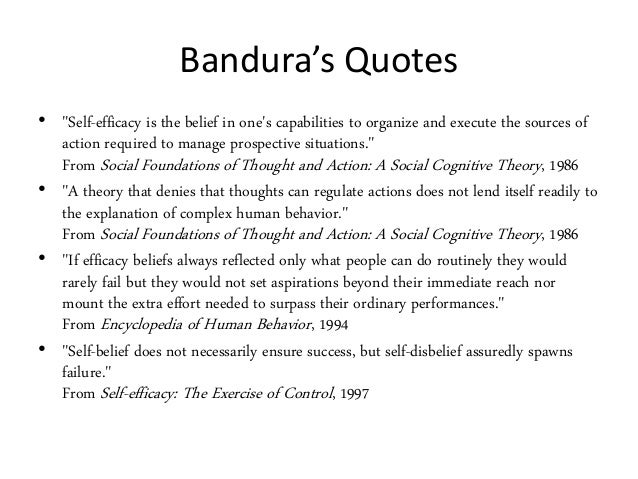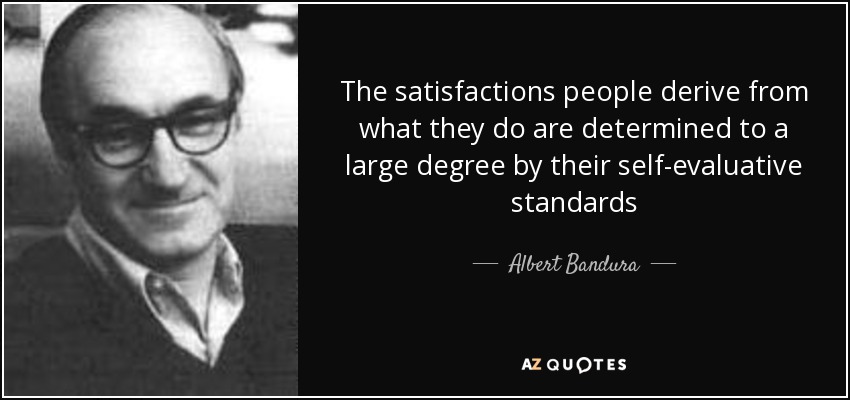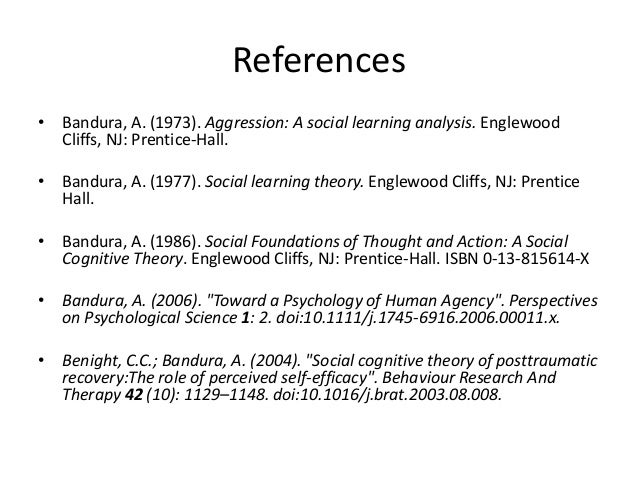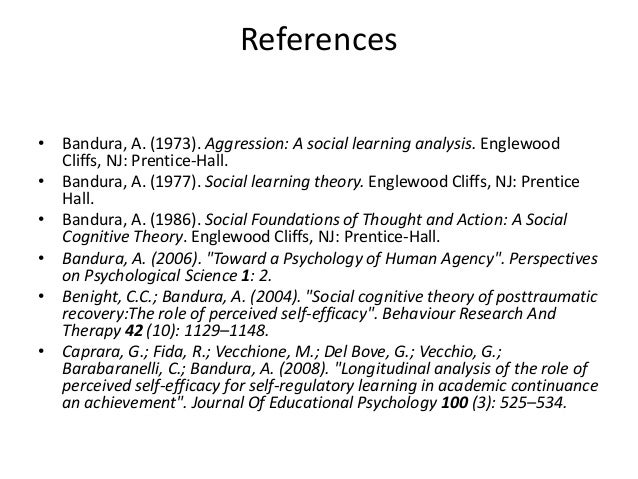Bandura 1986 citation information
Home » Trend » Bandura 1986 citation informationYour Bandura 1986 citation images are available. Bandura 1986 citation are a topic that is being searched for and liked by netizens today. You can Find and Download the Bandura 1986 citation files here. Get all free vectors.
If you’re looking for bandura 1986 citation pictures information related to the bandura 1986 citation keyword, you have visit the right blog. Our website frequently gives you suggestions for viewing the highest quality video and image content, please kindly search and locate more informative video articles and graphics that fit your interests.
Bandura 1986 Citation. Article citations more>> bandura, a. Two aspects to the exercise of control are especially relevant to the management of organizational functioning (bandura, 1986; On t his regards, bandura (1986), criticized this process and believed that external, environmental reinforcement is not the only factor to influence learning and behavior. Bandura, a., & cervone, d.
 Bandura�s (1986) model of triadic reciprocality From researchgate.net
Bandura�s (1986) model of triadic reciprocality From researchgate.net
Attention, retention, reproduction, and motivation. Article citations more>> bandura, a. Social foundations of thought and action: To be an agent is to influence one�s own functioning and events that affect. Article citations more>> bandura, a. Journal of clinical and social psychology, add to metacart.
With this theory, an individual is positioned to develop a real relationship with their environment and change in behavior depending on certain circumstances (luszczynska & ralf).
Indeed, the research and scholarly work conducted by bandura and colleagues set the occasion for the social cognitive perspective of learning (bandura, 1986), which seemed to challenge the possibility that all behavior could be accounted for by respondent and operant processes alone. (1986) by a bandura venue: A social cognitive theory, englewood cliffs, nj: The first concerns the level of personal efficacy to effect changes by productive use of capabilities and enlistment of effort. On t his regards, bandura (1986), criticized this process and believed that external, environmental reinforcement is not the only factor to influence learning and behavior. The social cognitive theory (bandura 1986) is a theory that can be described as a basis for learning whereby people can develop particular behavior by observing and imitating.
 Source: researchgate.net
Source: researchgate.net
The first concerns the level of personal efficacy to effect changes by productive use of capabilities and enlistment of effort. Two aspects to the exercise of control are especially relevant to the management of organizational functioning (bandura, 1986; Social foundations of thought and action: Research in observational learning represents a critical development in the history of psychology. The social cognitive theory (bandura 1986) is a theory that can be described as a basis for learning whereby people can develop particular behavior by observing and imitating.
 Source: researchgate.net
Source: researchgate.net
Two aspects to the exercise of control are especially relevant to the management of organizational functioning (bandura, 1986; Bandura�s (1986) proposition that an aggregate of group members� perceived confidence of the group as a whole would be more predictive of the group�s performance than an aggregate of the members� judgments of their own confidence when there is at least a moderate level of interdependent effort required of the group. Instructional model for social skills intervention children with visual impairment Article citations more>> bandura, a. Can do with whatever skills one possesses� (bandura, 1986, p.
 Source: researchgate.net
Source: researchgate.net
Can do with whatever skills one possesses� (bandura, 1986, p. Research in observational learning represents a critical development in the history of psychology. Has been cited by the following article: (1986) by a bandura venue: Attention is a process in which people selectively observe and extract information from the ongoing modeled activities (wood & bandura, 1989).
 Source: researchgate.net
Source: researchgate.net
The first concerns the level of personal efficacy to effect changes by productive use of capabilities and enlistment of effort. Social foundations of thought and action: Social foundations of thought and action: Journal of clinical and social psychology, add to metacart. The social cognitive theory (bandura 1986) is a theory that can be described as a basis for learning whereby people can develop particular behavior by observing and imitating.
 Source: slideshare.net
Source: slideshare.net
Toward a unifying theory of behavioral change. This constitutes the personal side of the transactional control process. Attention, retention, reproduction, and motivation. On t his regards, bandura (1986), criticized this process and believed that external, environmental reinforcement is not the only factor to influence learning and behavior. (1986) by a bandura venue:
 Source: researchgate.net
Source: researchgate.net
This constitutes the personal side of the transactional control process. Social foundations of thought and action: A social cognitive theory, englewood cliffs, nj: This constitutes the personal side of the transactional control process. Instructional model for social skills intervention children with visual impairment
 Source: slideshare.net
Source: slideshare.net
Toward a unifying theory of behavioral change. Social foundations of thought and action: The first concerns the level of personal efficacy to effect changes by productive use of capabilities and enlistment of effort. Bandura, a., cioffi, d., taylor, c. Toward a unifying theory of behavioral change.
 Source: researchgate.net
Source: researchgate.net
Next 10 → why do parents become involved in their children’s education. Published online by cambridge university press: Bandura�s (1986) proposition that an aggregate of group members� perceived confidence of the group as a whole would be more predictive of the group�s performance than an aggregate of the members� judgments of their own confidence when there is at least a moderate level of interdependent effort required of the group. Bandura, a., cioffi, d., taylor, c. (1986) by a bandura venue:
 Source: slideshare.net
Source: slideshare.net
Bandura, a., & cervone, d. Attention, retention, reproduction, and motivation. Social foundations of thought and action: Article citations more>> bandura, a. Bandura, a., & cervone, d.
 Source: pinterest.com
Source: pinterest.com
Journal of clinical and social psychology, add to metacart. The social cognitive theory (bandura 1986) is a theory that can be described as a basis for learning whereby people can develop particular behavior by observing and imitating. Bandura posited that the process of observational learning was governed by four key aspects: Attention, retention, reproduction, and motivation. Can do with whatever skills one possesses� (bandura, 1986, p.
 Source: researchgate.net
Source: researchgate.net
Social foundations of thought and action: Can do with whatever skills one possesses� (bandura, 1986, p. Journal of clinical and social psychology, add to metacart. Social foundations of thought and action: Social foundations of thought and action:
 Source: researchgate.net
Source: researchgate.net
Indeed, the research and scholarly work conducted by bandura and colleagues set the occasion for the social cognitive perspective of learning (bandura, 1986), which seemed to challenge the possibility that all behavior could be accounted for by respondent and operant processes alone. Social foundations of thought and action: Has been cited by the following article: Research in observational learning represents a critical development in the history of psychology. Social foundations of thought and action:
 Source: researchgate.net
Source: researchgate.net
Bandura�s (1986) proposition that an aggregate of group members� perceived confidence of the group as a whole would be more predictive of the group�s performance than an aggregate of the members� judgments of their own confidence when there is at least a moderate level of interdependent effort required of the group. With this theory, an individual is positioned to develop a real relationship with their environment and change in behavior depending on certain circumstances (luszczynska & ralf). Social foundations of thought and action: Attention is a process in which people selectively observe and extract information from the ongoing modeled activities (wood & bandura, 1989). Bandura, a., cioffi, d., taylor, c.
 Source: azquotes.com
Source: azquotes.com
Next 10 → why do parents become involved in their children’s education. Can do with whatever skills one possesses� (bandura, 1986, p. Social foundations of thought and action: (1986) by a bandura venue: Bandura, a., cioffi, d., taylor, c.
 Source: slideshare.net
Source: slideshare.net
Indeed, the research and scholarly work conducted by bandura and colleagues set the occasion for the social cognitive perspective of learning (bandura, 1986), which seemed to challenge the possibility that all behavior could be accounted for by respondent and operant processes alone. Can do with whatever skills one possesses� (bandura, 1986, p. Social foundations of thought and action: Social foundations of thought and action: Social foundations of thought and action:
 Source: researchgate.net
Source: researchgate.net
Social foundations of thought and action: Attention, retention, reproduction, and motivation. The first concerns the level of personal efficacy to effect changes by productive use of capabilities and enlistment of effort. A social cognitive theory, albert bandura englewood cliffs, new jersey: Social foundations of thought and action:
 Source: researchgate.net
Source: researchgate.net
This constitutes the personal side of the transactional control process. Published online by cambridge university press: Has been cited by the following article: Two aspects to the exercise of control are especially relevant to the management of organizational functioning (bandura, 1986; A social cognitive theory, englewood cliffs, nj:
 Source: slideshare.net
Source: slideshare.net
A social cognitive theory, englewood cliffs, nj: (1986) by a bandura venue: Attention is a process in which people selectively observe and extract information from the ongoing modeled activities (wood & bandura, 1989). Has been cited by the following article: Bandura, a., & national inst of mental health.
This site is an open community for users to submit their favorite wallpapers on the internet, all images or pictures in this website are for personal wallpaper use only, it is stricly prohibited to use this wallpaper for commercial purposes, if you are the author and find this image is shared without your permission, please kindly raise a DMCA report to Us.
If you find this site serviceableness, please support us by sharing this posts to your own social media accounts like Facebook, Instagram and so on or you can also save this blog page with the title bandura 1986 citation by using Ctrl + D for devices a laptop with a Windows operating system or Command + D for laptops with an Apple operating system. If you use a smartphone, you can also use the drawer menu of the browser you are using. Whether it’s a Windows, Mac, iOS or Android operating system, you will still be able to bookmark this website.
Category
Related By Category
- Apa book citation more than one author information
- Adjust citation style refworks information
- Apa citation generator online website information
- Bibtex citations information
- Apa citation format generator citation machine information
- Asa citation format information
- Apa citation format conference paper information
- Brain citation style information
- Appa citaat information
- Apa format citation online information